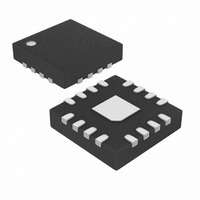MAX6965ATE+T Maxim Integrated Products, MAX6965ATE+T Datasheet - Page 14

MAX6965ATE+T
Manufacturer Part Number
MAX6965ATE+T
Description
IC LED DRIVER LINEAR 16-TQFN
Manufacturer
Maxim Integrated Products
Type
Linear (I²C Interface)r
Datasheet
1.MAX6965AEE.pdf
(22 pages)
Specifications of MAX6965ATE+T
Topology
Open Drain, PWM
Number Of Outputs
9
Internal Driver
Yes
Type - Primary
Backlight, LED Blinker
Type - Secondary
RGB, White LED
Frequency
400kHz
Voltage - Supply
2 V ~ 3.6 V
Voltage - Output
7V
Mounting Type
Surface Mount
Package / Case
16-TQFN Exposed Pad
Operating Temperature
-40°C ~ 125°C
Current - Output / Channel
50mA
Internal Switch(s)
Yes
Number Of Segments
6
Operating Supply Voltage
2 V to 3.6 V
Maximum Supply Current
110 uA
Maximum Power Dissipation
1176 mW
Maximum Operating Temperature
+ 125 C
Mounting Style
SMD/SMT
Minimum Operating Temperature
- 40 C
Lead Free Status / RoHS Status
Lead free / RoHS Compliant
Efficiency
-
Lead Free Status / Rohs Status
Details
The MAX6965 includes an internal oscillator, nominally
32kHz, to generate PWM timing for LED intensity control
or other applications such as PWM trim DACs. PWM can
be disabled entirely for all the outputs. In this case, all
outputs are static and the MAX6965 operating current is
lowest because the internal PWM oscillator is turned off.
The MAX6965 can be configured to provide any combi-
nation of PWM outputs and glitch-free logic outputs.
Each PWM output has an individual 4-bit intensity con-
trol (Table 12). When all outputs are to be used with the
same PWM setting, the outputs can be controlled
together instead of using the global intensity control
(Table 11). Table 8 shows how to set up the MAX6965
to suit a particular application.
The PWM control uses a 240-step PWM period, divided
into 15 master intensity timeslots. Each master intensity
timeslot is divided further into 16 PWM cycles (Figure 12).
The master intensity operates as a gate, allowing the indi-
vidual output settings to be enabled from 1 to 15 timeslots
per PWM period (Figures 13, 14, and 15) (Table 11).
9-Output LED Driver with Intensity Control
and Hot-Insertion Protection
Figure 11. BLINK Logic
Figure 12. PWM Timing
14
BLINK ENABLE FLAG E
BLINK FLIP FLAG B
______________________________________________________________________________________
BLINK INPUT
14
15 16
15
1
1
2
PWM Intensity Control
3
2
4
5
3
EACH MASTER INTENSITY
TIMESLOT CONTAINS 16
6
PWM CYCLES
7
4
8
PWM Timing
9 10 11 12 13 14 15 16
ONE PWM PERIOD IS 240 CYCLES OF THE 32kHz PWM
OSCILLATOR. A PWM PERIOD CONTAINS 15 MASTER
5
BLINK PHASE
REGISTERS
6
INTENSITY TIMESLOTS
7
8
Each output’s individual 4-bit intensity control only
operates during the number of timeslots gated by the
master intensity. The individual controls provide 16
intensity settings from 1/16 through 16/16 (Table 12).
Figures 16, 17, and 18 show examples of individual
intensity control settings. The highest value an individ-
ual or global setting can be set to is 16/16. This setting
forces the output to ignore the master control, and fol-
low the logic level set by the appropriate blink phase
register bit. The output becomes a glitch-free static out-
put with no PWM.
When blink is disabled (Table 5), the blink phase 0 regis-
ter specifies each output’s logic level during the PWM on-
time (Table 6). The effect of setting an output’s blink
phase 0 register bit to 0 or 1 is shown in Table 9. With its
output bit set to zero, an LED can be controlled with 16
intensity settings from 1/16th duty through fully on, but
cannot be turned fully off using the PWM intensity control.
With its output bit set to 1, an LED can be controlled with
16 intensity settings from fully off through 15/16th duty.
When blink is enabled (Table 5), the blink phase 0 regis-
ter and blink phase 1 register specify each output’s logic
level during the PWM on-time during the respective blink
phases (Tables 6 and 7). The effect of setting an output’s
blink phase register bit to 0 or 1 is shown in Table 10.
LEDs can be flipped between either directly on and off,
or between a variety of high/low PWM intensities.
1
9
Using PWM Intensity Controls with Blink Disabled
Using PWM Intensity Controls with Blink Enabled
2
10
11
12
13
14
15
1
2











